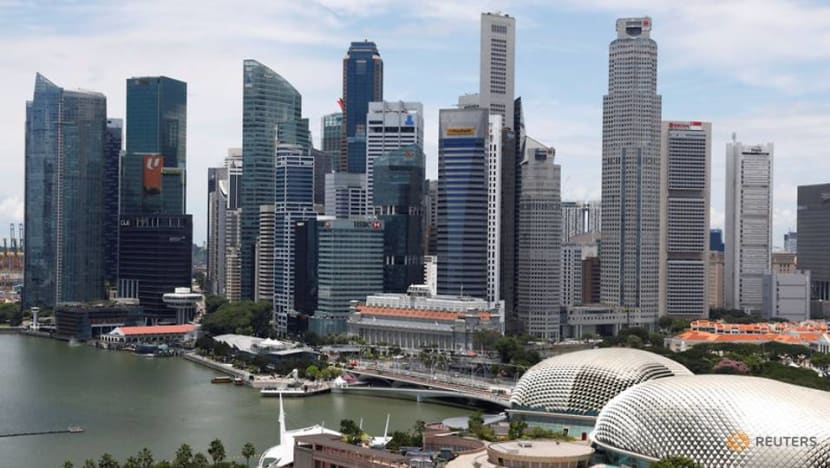Singapore's core inflation increases at a faster pace in May

A view of the skyline in Singapore, Sep 12, 2018. (Photo: Reuters/Edgar Su)
SINGAPORE: Singapore’s consumer prices rose in May, driven mainly by higher services inflation and a smaller decline in the cost of retail and other goods, data showed on Wednesday (Jun 23).
This is the fourth straight month that Singapore’s core inflation has remained positive.
Core inflation increased to 0.8 per cent year-on-year in May, up from the previous month’s 0.6 per cent, according to data from the Monetary Authority of Singapore (MAS) and Ministry of Trade and Industry (MTI).
The headline consumer price index (CPI), or overall inflation, rose to 2.4 per cent year-on-year in May, up from 2.1 per cent in April, on account of higher private transport and accommodation inflation, as well as the increase in core inflation.
Core inflation excludes the price of private transport and accommodation.
“The increase in core and headline year-on-year inflation was partly due to the low base in May last year when the circuit breaker measures were in place,” said the authorities.
READ: Singapore economy may grow more than 6% this year, but recovery will be ‘disparate’ across sectors: MAS
TRANSPORT COSTS, SERVICES WENT UP
Private transport costs rose 14.5 per cent year-on-year in May, a sharper increase from the previous month’s 12.9 per cent. This was largely due to a steeper increase in petrol prices, while car prices also picked up at a faster pace in May.
“The steeper year-on-year increase in petrol costs partly reflected the low base in May last year when petrol prices saw a significant decline,” said the authorities.
READ: Private-sector economists raise Singapore’s 2021 growth forecast again to 6.5%: MAS survey
READ: Employment grows more than expected in Q1, but uncertainties weigh on recovery: MOM
Services inflation rose to 1.4 per cent year-on-year in May as telecommunication services fees, point-to-point transport and health insurance inflation increased.
Accommodation inflation also edged up to 0.9 per cent year-on-year in May, up from 0.7 per cent in April, as housing rents rose at a faster pace.
The cost of retail and other goods fell "more gradually" by 0.8 per cent year-on-year in May, compared to the -1.1 per cent in April. The price of household durables registered a larger increase, while clothing and footwear prices fell by a "smaller extent", said MTI and MAS.
Electricity and gas prices also fell by 1.9 per cent year-on-year in May, compared to the -2.4 per cent in April.
The slower-paced fall was "largely" on account of the open electricity market having a smaller dampening effect on electricity prices following a slowdown in new take‐up rates, as well as a stronger pickup in gas prices, said the authorities.
Food inflation in May remained unchanged from April at 1 per cent year-on-year, as both non-cooked food and prepared meals inflation were “broadly stable”, data showed.
OVERALL INFLATION EXPECTED TO REMAIN ELEVATED IN NEAR TERM
MAS and MTI said external inflation has risen amid the recovery in global oil prices and "turnaround in producer price inflation in the major economies”.
“While there are some upside risks, the upward pressure on global inflation should ease in the latter part of this year,” they said.
“Surplus oil production capacity should cap the extent of oil price increases, while continued negative output gaps in some of Singapore’s major trading partners should moderate import price pressures.”
In Singapore, overall inflation is expected to remain elevated at around current rates in the near term and ease in the second half of the year as base effects fade, the authorities added.
Core inflation will continue to gradually increase, though the measures announced under Phase 2 (Heightened Alert) and the continued restrictions under Phase 3 (Heightened Alert) could have an “overall dampening effect on the pickup in underlying inflation”, MAS and MTI said.
“In addition, uncertainty in the economic outlook will weigh on consumer sentiment and hence price increases in the near term.”
Wage growth for the year as a whole is expected to be muted as slack in the labour market will take time to be fully absorbed, while commercial rents are projected to stay low, the authorities said.
Private transport and accommodation costs should remain resilient on the back of firm demand for cars and rental accommodation.
Core inflation is expected to average 0 to 1 per cent in 2021, while the overall inflation is forecast to come between 0.5 per cent and 1.5 per cent.












